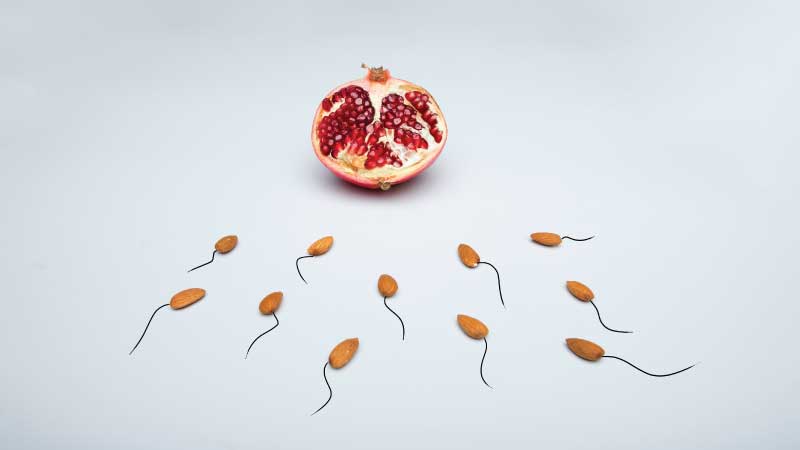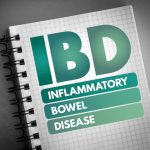Often when the issue of infertility is discussed, the conversation focuses almost exclusively on issues of female infertility, but the reality is that male causes of infertility are just as important to consider – up to 50% of infertility in couples is due to male fertility issues. In fact, the issue of male infertility is one that is on the increase; studies in recent years have identified a noticeable global increase in rates of male infertility. But what causes male infertility, and what can we do to improve fertility in men? If you and your partner are considering trying to conceive, this post will help you to identify some of the most common factors that interfere with male fertility and why, as well as giving you vital information to help you combat male infertility and improve your overall health.
So, What Causes Male Infertility?
Here Are Some Factors Affecting Male Fertility:
Nutrition
Nutrition is a hugely important consideration for male fertility. Ensuring your body has the building blocks required for healthy sperm production and making sure you are not consuming foods which damage sperm cells, should be the first step in working towards healthy conception. High intakes of red and processed meats, high-sugar foods and saturated and trans fatty acids are all associated with poor sperm quality. Excessive caffeine consumption can negatively affect male fertility by damaging sperm cell DNA and causing abnormal sperm cells to form.
Boosting Male Fertility Through Nutrition
- Eat a balanced diet high in nutrient-dense foods and ensure you are eating adequate amounts of key fertility-boosting nutrients
- Plenty of fresh fruits and vegetables –ideally organic. Aim for as much variety as possible, focusing on eating as many different colours of vegetables as you can each day (always be sure to wash your fruits and vegetables before consumption)
- Opt for high quality protein sources, such as wild caught fish, legumes, grass-fed organic meats, and free-range, organic eggs. Reduce your intake of highly processed meats such as sausages, and deli meats like ham and pastrami. Limit red meat consumption to once or twice per week.
- Choose lower GI, wholegrain carbohydrates such as brown rice and wholegrain breads. Gluten free may also be recommended by your naturopath.
- Avoid consuming sugary foods and drinks such as cakes, pastries, confectionary, and soft drinks.
- Increase your intake of key nutrients needed for healthy sperm production and hormone levels
- Zinc: Zinc is a particularly important nutrient when it comes to men’s health and male fertility and is found in high concentrations within semen. Zinc acts as an anti-inflammatory, helps with sperm cell structure and function, and even acts as an antioxidant to protect sperm cells against damage. Dietary sources of zinc include beef, fish, eggs, sunflower seeds, pumpkin seeds, and whole grains.
- Omega-3 fatty acids: Higher intake of omega-3 fatty acids are associated with healthier sperm cells. Dietary sources of omega-3 fatty acids include fatty fish such as salmon, mackerel, and sardines, as well as flaxseeds, chia seeds and walnuts. Buy wild caught fish if you can due to potential hormones in farmed fish or buy from farmers where seafood is fed on an organic diet and free of chemicals, antibiotics, and hormones.
- Vitamin D: Having healthy vitamin D levels is associated with better sperm quality. The best way to ensure adequate vitamin D levels is through healthy sun exposure – even just 15 minutes per day can be enough to boost your levels. Dietary vitamin D can be found in organic, free-range eggs and fish.

Oxidative Stress
Oxidative stress is a particularly important issue to consider when it comes to male infertility. Excess oxidative stress can physically damage sperm cells via damaging cell DNA. Sources of oxidative stress are many and varied, including alcohol consumption, smoking, toxin exposure, obesity, stress, and even underlying medical conditions causing inflammation. Our body’s main defence against oxidative stress are antioxidant compounds as found in our food, so diet (and appropriate supplementation when required) are our best weapons in preventing oxidative damage to sperm cells. Whilst it is important to ensure you are eating foods that contain a wide range of antioxidants, there are a few specific antioxidant compounds that are particularly beneficial for supporting healthy sperm cells:
- Vitamin C: Found in strawberries, oranges, papaya, kiwifruit, tomatoes, broccoli, Brussels sprouts, cauliflower, capsicum
- Lycopene: Found in tomatoes (especially cooked tomatoes), watermelon, grapefruit, capsicum, watermelon
- Coenzyme Q10: Found in fatty fish such as mackerel and sardines, spinach, cauliflower, broccoli, oranges, strawberries, lentils
- N-acetyl cysteine: Found in chicken, eggs, lentils, sunflower seeds, and many other protein-rich foods

Alcohol, Cigarette Smoking and Other Drugs
Heavy consumption of alcohol can reduce fertility by affecting sperm concentration and growth. Chronic alcohol use can also lead to reduced levels of important fertility hormones in men, including testosterone and progesterone, by interrupting the brain’s feedback loop for producing these hormones. Cigarette smoking disrupts male fertility by damaging DNA in sperm cells and causing oxidative stress. Recreational drugs, including marijuana, cocaine, and even anabolic steroids, all negatively affect fertility by causing disruptions to normal hormone production. Eliminating alcohol, cigarettes, and other drugs from your lifestyle before trying to conceive is vital.
Heat Exposure
Sperm cells are heat sensitive, meaning they need to be kept within a narrow temperature range to survive. Possible sources of heat exposure can include:
- Occupational exposure to high heats – e.g., commercial kitchens, certain industrial facilities
- Sitting for long periods of time
- Tight-fitting underwear
- Placing your laptop on your lap for long periods of time
- Frequent sauna sessions or long, hot baths
Avoiding excess heat exposure by not sitting for extended periods of time, wearing loose-fitting underwear, avoiding keeping your laptop on your lap for too long, and minimising your saunas and hot baths, can mean boosting your sperm health and fertility.
Obesity
Excess body fat can reduce fertility in men because of the hormonal effects of fat tissue on the body. Excess fat tissue converts testosterone in oestrogen, reducing available testosterone needed for healthy sperm production. In addition, obesity in men has been linked with an increased risk of pregnancy complications. If you are overweight or obese, consider speaking to your naturopath about a weight reduction plan that will suit your needs.

Radiation Exposure
We are exposed to various types of radiation in our daily lives that can impact on male fertility, including Wi-Fi, mobile phones, and Bluetooth. Exposure of the testes to these types of radiation can negatively impact on healthy sperm production. To help combat this, avoid keeping your mobile phone or other digital devices in your pants pockets, to keep radiation away from your testes.
Xenoestrogens and Endocrine Disruptors
Xenoestrogens are chemicals that mimic the effects of oestrogen in the body. One of the most common xenoestrogens that many of us find ourselves exposed to is BPA, or bisphenol-A. BPA is a compound found in many plastics we use in our day-today lives, but it can have a significant negative impact on male fertility. Because its chemical structure is similar to oestrogen, BPA is actually able to bind to oestrogen receptors within the body, where it acts like an extra-strong type of oestrogen and tricks the brain into reducing testosterone and sperm cell production – meaning fewer sperm cells are made. Other toxins that may disrupt fertility in men include heavy metals (such as lead and mercury) and pesticides (including garden sprays and insect sprays).
The best way to reduce their effect on fertility is to reduce your exposure:
- Avoid exposure to BPA and other xenoestrogens
- Avoid plastic food containers and water bottles
- Do not microwave food in plastic containers – reheat foods on the stove top or in the oven, or if you do choose to use a microwave, use microwave-safe glass containers
- Use natural skin care products and cleaning products in your home
- Avoid exposure to pesticides
- Choose organic gardening methods and avoid using Round-Up in your garden
- Wash fruits and vegetables thoroughly before eating and choose organic where possible
- Avoid exposure to heavy metals
- Use a water filter to reduce impurities and contaminants from tap water
- Reduce consumption of foods which may be contaminated with heavy metals, particularly fish such as shark, swordfish and bluefin tuna – opt for lower mercury varieties such as sardines, mackerel, and salmon

Psychological stress
Psychological stress can be a common issue when it comes to male infertility. Stress activates the body’s hypothalamic-pituitary-adrenal axis (HPA axis), also known as the “flight or fight response”, leading to elevated levels of hormones such as cortisol and can increase oxidative stress and inflammation. These changes in the body disrupt normal testosterone production and sperm production. Daily physical activity, mindfulness meditation, and talk therapies such as counselling are all great ways to help you manage your stress.
To find out more about supporting your fertility and overall health, please book an appointment.
References
Castellini, C., Totaro, M., Parisi, A., D’Andrea, S., Lucente, L., Cordeschi, G., Francavilla, S., Francavilla, F., & Barbonetti, A. (2020). Bisphenol A and male fertility: Myths and realities. Frontiers in Endocrinology, 11(353).
Fallah, A., Mohammad-Hasani, A., & Colagar, A. H. (2018). Zinc is an essential element for male fertility: A review of Zn roles in men’s health, germination, sperm quality, and fertilization. Journal of Reproduction and Infertility, 19(2).
Hechtman, L. (2012). Clinical naturopathic medicine. Elsevier Australia.
Lesiegang, K., & Dutta, S. (2020). Do lifestyle practices impede male fertility? Andrologia, 00:e13595. https://doi.org/10.5534/wjmh.2017.35.2.59
Martin-Hidalgo, D., Bragado, M. J., Batistia, A. R., Oliveira, P. F., & Alves, M. G. (2019). Antioxidants and male fertility: From molecular studies to clinical evidence. Antioxidants, 8(89). https://doi.org/10.3390/antiox8040089
Ricci, E., Vigano, P., Cipriani, S., Edgardo, S., Chiaffarino, F., Bulfoni, A., & Parazzini, F. (2017). Coffee and caffeine intake and male infertility: A systematic review. Nutrition Journal, 16(37). https://doi.org/10.1186/s12937-017-0257-2
Salas-Huetos, A., Bullo, M., & Salas-Salvado, J. (2017). Dietary patterns, foods, and nutrients in male fertility parameters and fecundability: A systematic review of observational studies. Human Reproduction Update, 23(4), 371–389. https://doi.org/10.1093/humupd/dmx006
Schuppe, H.-C., Pilatz, A., Hossain, H., Diemer, T., Wagenlehner, F., & Weidner, W. (2017). Urogenitcal infection as a risk factor for male infertility. Deutsches Arzteblatt International, 114, 339–346.
Suliga, E., & Gluszek, S. (2020). The relationship between diet, energy balance and fertility in men. International Journal of Vitamin and Nutrition Research, 90(5–6), 514–526. https://doi.org/10.1024/0300-9831/a000577











